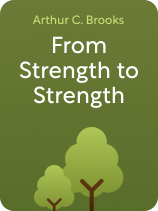

This article is an excerpt from the Shortform book guide to "From Strength to Strength" by Arthur C. Brooks. Shortform has the world's best summaries and analyses of books you should be reading.
Like this article? Sign up for a free trial here.
Are you over 35? Have you successfully transitioned into the last half of your life, or are you prepared to do so?
In From Strength to Strength, management expert Arthur Brooks explains how and why you lose your job skills as you get older. Then, he provides solutions. He shows how you can find a job that suits your changing brain and achieve a meaningful life instead of fruitlessly chasing success in your former field.
Keep reading for Brooks’s strategies as well as an exercise that will help you prepare now for the transition to the second half of life.
Fulfillment in the Second Half of Life
Brooks begins by saying that, for people working in practically any skilled job, professional decline sets in sometime between their late 30s and early 50s. This means that they start losing their job skills—they can’t think as quickly and solving problems becomes more difficult. Further, if the job is physically demanding, they find themselves becoming physically weaker and more prone to injury. He provides two solutions to this problem so that you can continue to thrive throughout the second half of life.
Solution #1: Find Work That Suits Your Changing Brain
While professional decline sounds disheartening, Brooks says you can turn this potential deterioration into an opportunity to find new types of success in the second half of your life.
To clarify how a mental decline can lead you to new kinds of success, Brooks first explains that you’re not really getting less intelligent as you age; rather, you’re becoming weaker in some areas but stronger in others. Therefore, to continue being successful in your career, you just need to start relying on a different type of intelligence and find work that suits this different skill set.
According to Brooks, British psychologist Raymond Cattell believes there are two different types of intelligence. Fluid intelligence relies on creativity and quick thinking, and it peaks in early adulthood. Crystallized intelligence relies on knowledge and experience, so it increases as you age. Many skilled jobs rely on fluid intelligence, which is why Brooks says your professional skills will also begin to deteriorate in your 30s and 40s.
Brooks says that leaning into your crystallized intelligence will allow you to be successful in your later years. He suggests switching to a career path that relies on your accrued knowledge and experience (rather than your waning reasoning and creativity). This usually means a position in which you’re guiding other people, such as a counselor, an advisor, or a coach.
In short, instead of despairing over the abilities you’ll lose as you age, take pride and joy in the knowledge you’ll continue to gain—and think about how you can use your wisdom to help others.
Solution #2: Redefine “Success”
Finding a career where you can keep excelling as you get older is important, but it’s only one part of a successful later life. Brooks says that, to feel truly happy and fulfilled at this time, you must redefine success. Instead of continuing to focus on professional success, you should dedicate yourself to life success—in other words, living a well-rounded life full of contentment and love.
Let’s discuss three specific ways Brooks says you can find life success: by prioritizing your eulogy values, nurturing your connections with other people, and finding (or practicing) a system of beliefs that’s meaningful to you.
Strategy #1: Find Life Success Through Your Eulogy Values
One way to pursue life success is to start prioritizing what Brooks calls eulogy virtues—so-called because they’re qualities that people might talk about at your funeral. In contrast, many people (especially young people) tend to focus on their résumé virtues. These are accomplishments that you might use to impress others.
Strategy #2: Find Life Success Through Your Connections
Another key theme in Brooks’s suggestions for pursuing life success is that competing against others brings professional success while connecting with others brings life success. According to Brooks, some research suggests healthy relationships are the single most important factor in maintaining your physical, mental, and emotional health as you age.
Strategy #3: Find Life Success Through Your Beliefs
Finally, Brooks says faith is crucial to happiness later in life, citing numerous studies suggesting that religious and spiritual people tend to be happier and healthier than their atheist counterparts. He thinks this is because faith and spirituality help to put your life into perspective. They take your focus off yourself and your problems; instead, you start thinking about the nature of the universe, the purpose of life, and your part in making the world a better place for everyone.
However, belief in the divine isn’t the only way to achieve life success. Brooks says that people who reject religion and spirituality can often find meaning in philosophy—it has many of the same benefits, such as pulling your attention away from selfish pursuits, instead encouraging you to seek happiness by living well and making the world better.
Exercise: Start Preparing for the Second Half of Your Life
We’ve explored numerous ways that you can be happy and fulfilled even after your professional decline. Now, regardless of your current age, take some time to apply what you’ve learned and start planning for the later years of your life.
- What position or career path could you aspire to that lets you use your knowledge and experience as you age? (For example, if you’re currently an office worker, becoming a training manager for your company could play to these strengths.)
- How can you start pursuing life success today by fostering your connections with other people? (For example, perhaps you could make plans with a friend or strike up a conversation with one of your coworkers at lunch.)
- How can you start pursuing life success today by connecting with your religious, spiritual, or philosophical beliefs? (For example, you might study a book that’s important to your religion, or start learning about a school of philosophy that sounds interesting to you.)

———End of Preview———
Like what you just read? Read the rest of the world's best book summary and analysis of Arthur C. Brooks's "From Strength to Strength" at Shortform.
Here's what you'll find in our full From Strength to Strength summary:
- Why our professional skills start to decline as we get older
- How second half of your life can be even happier than the first
- How to find a new career path that suits your changing skill set






